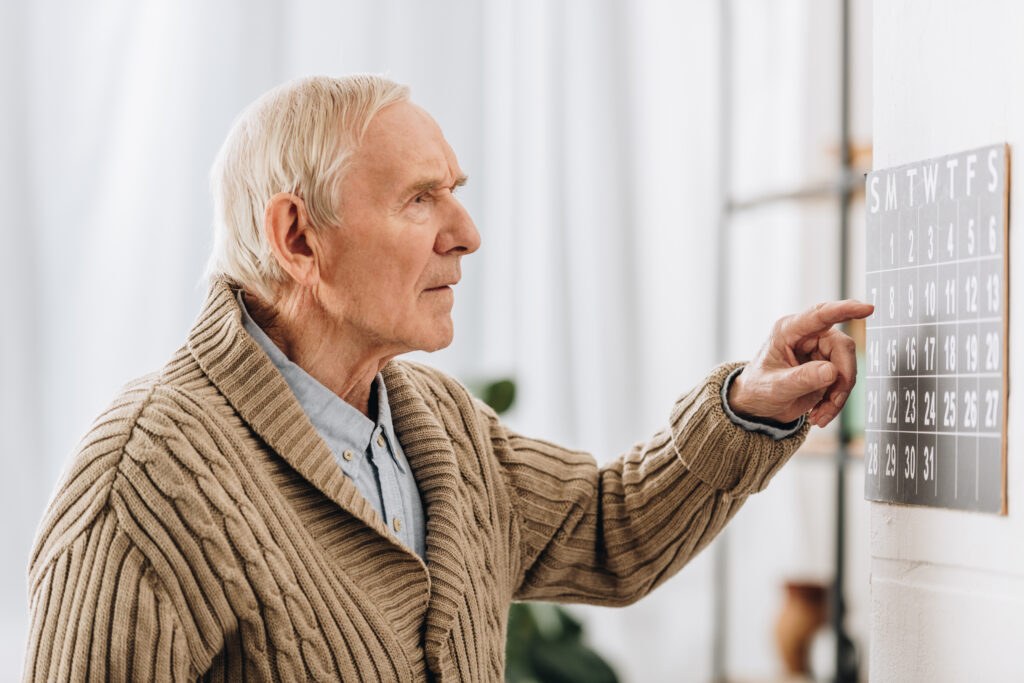When is it time to worry if your loved one has Alzheimer’s or dementia?

Sara and Michael are constantly worried about their father, who lives alone, a three-hour drive away from them. They think he’s showing early signs of dementia because he doesn’t seem to remember if he fed the dog, repeats his stories, and has become even more reclusive and grouchy lately.
Often, families reach out when they begin to see changes in their loved ones but don’t know what to do next. So, when is the time to start planning to help your loved one thrive despite brain changes?
Alzheimer’s First Symptoms
According to the Alzheimer’s Association, there are several warning signs for Alzheimer’s Disease and other forms of dementia:
- Memory loss that disrupts daily life
- Challenges planning or solving problems
- Difficulty completing familiar tasks
- Confusion with time or place
- Trouble understanding visual images and spatial relationships
- New problems with words in speaking or writing
- Misplacing things and losing the ability to retrace steps
- Decreased or poor judgment
- Withdrawing from work or social activities
- Changes in mood and personality
Of course, memory loss is the biggest and first red flag, but how does one determine if it’s simply normal forgetfulness, part of the aging process? Forgetting an appointment isn’t a concern, especially if the person remembers that appointment later. But memory loss that interferes with daily living – forgetting how to use the microwave or phone, not remembering the way to get home – is considered one of the earliest clues of dementia.
Even the youngest people forget where they put their car keys, but some of the more serious warning signs of dementia might be forgetting the word for keys or not being able to retrace steps in the house to find them.
Memory loss isn’t the only sign of dementia: a key indicator in Alzheimer’s disease and other forms of dementia is a change in mood or personality. If Sara and Michael’s father had always been grumpy and reclusive, that’s not necessarily a change in personality. However, if he previously had been socially active and the life of the party, but they notice he doesn’t have any interest in being around people any longer, that, together with some of the other signs, might be concerning.
The Stages of Dementia
Dementia, like many other diseases, occurs in stages. There are seven different stages of dementia:
- No impairment. Someone at this stage will show no symptoms, but tests may reveal a problem.
- Very mild decline. You may notice slight changes in behavior, but your loved one will still be independent.
- Mild decline. You’ll notice more changes in their thinking and reasoning. They may have trouble making plans, and they may repeat themselves a lot. They may also have a hard time remembering recent events.
- Moderate decline. They’ll have more problems with making plans and remembering recent events. They may have a hard time traveling and handling money.
- Moderately severe decline. They may not remember their phone number or their grandchildren’s names. They may be confused about the time of day or day of the week. At this point, they’ll need assistance with some basic day-to-day functions, such as picking out clothes to wear.
- Severe decline. They’ll begin to forget the name of their spouse. They’ll need help going to the restroom and eating. You may also see changes in their personality and emotions.
- Very severe decline. They can no longer speak their thoughts. They can’t walk and will spend most of their time in bed.
Cardinal Ritter Senior Services has five memory care communities on our Shrewsbury campus. To learn more about our memory care services, visit our memory care page.